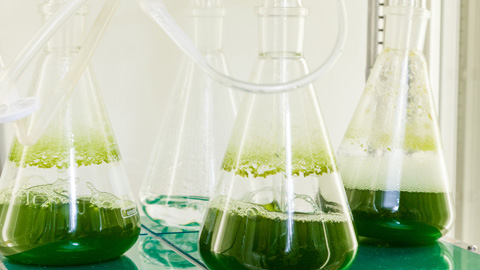The Nordic research funding agency NordForsk has granted a Nordic Centre of Excellence (NCoE) status in its Bioeconomy Programme to the University of Turku. A project called ”Towards versatility of aquatic production platforms: unlocking the value of Nordic bioresources” (NordAqua) was funded with 30 million Norwegian krone, and will operate with the NCoE status during 2017-2022.
NordAqua focuses on blue bioeconomy, i.e. bioeconomy related to aquatic resources, particular emphasis being on micro- and macroalgae and their utilisation. The Nordic Centre of Excellence will perform applied research which stems from the long-term basic research conducted at both the host unit at the University of Turku and the collaboration partner institutions in other Nordic countries.
– There are plenty of unutilised possibilities in algae in terms of bioenergy, chemical industry, cosmeceuticals, nutrition or medicines, among others. It is known already that it is possible to isolate natural compounds from cyanobacteria that might be used as anticancer compounds, or that the proteins isolated from algae are likely more easily accepted by consumers than the insect-based proteins, says the director of the Nordic Centre of Excellence, Academy Professor Eva-Mari Aro.
The NordAqua NCoE will focus on microalgae isolated from native Nordic environments.
– Our aim is to combine the microalgae culture collections and databases of the partner laboratories, and to make the merged database available for the industry as well. It is important to study the algae species from the Nordic environment in particular, since those species have acclimated to live under almost continuous light during the summer months, while during other seasons they are forced to live under low light intensity and low temperature. Here in the Nordic countries, it is not possible to effectively utilise algae species acclimated to warmer climates, says Aro.
Top-level Basic Research Enables Commercial Utilisation
The widely established knowledge on the basic research of molecular plant biology at the University of Turku provides wealthy of opportunities for increasing the utilisation of algae.
– We can apply biotechnology tools for genetic modification of algae. This enables us, for example, to increase the production of high-value chemicals that algae naturally produce only in low amounts, either by accelerating the respective metabolic routes or by modifying the algae so that it secrete the target product to the growth media. Synthetic biology tools, in turn, enable unicellular algae to produce well-designed end-products, even those not existing in nature, says Aro who also leads the Academy of Finland’s national Molecular Biology of Primary Producers Centre of Excellence.
In addition to the researchers from Molecular Plant Biology Unit, Professor Jarna Heinonen and her research team studying entrepreneurship at the Turku School of Economics are involved in the NordAqua NCoE. One aim of NordAqua is to increase the number of start-ups related to blue bioeconomy as well as research-based spin-offs.
The thematic basis of NordAqua is closely connected to biofuture which is one of the strategic profiling areas of the University of Turku.
– The status as a Nordic Centre of Excellence proves that we are on the right track in our strategic profiling area, says Aro.
The Finnish partners of the University of Turku, the host institute of NordAqua, are the University of Helsinki, VTT (Technical Research Centre of Finland Ltd) and Natural Resources Institute Finland (LUKE). From Sweden, research groups from the Umeå University and the Uppsala University are represented in the NordAqua, and the Norwegian partners come from the University of Bergen, Norwegian Institute of Bioeconomy Research (NIBIO), Norwegian Institute for Water Research (NIVA) and the SINTEF Fisheries and Aquaculture. Furthermore, NordAqua has several industrial and societal partners, e.g. Smart Chemistry Park (Turku Science Park), the Central Union of Agricultural Producers and Forest Owners (MTK) and the Finnish Bioindustries FIB.
Nordforsk selected altogether three Nordic Centres of Excellence in the two-phased call.
TS / SY
Photo: Hanna Oksanen
